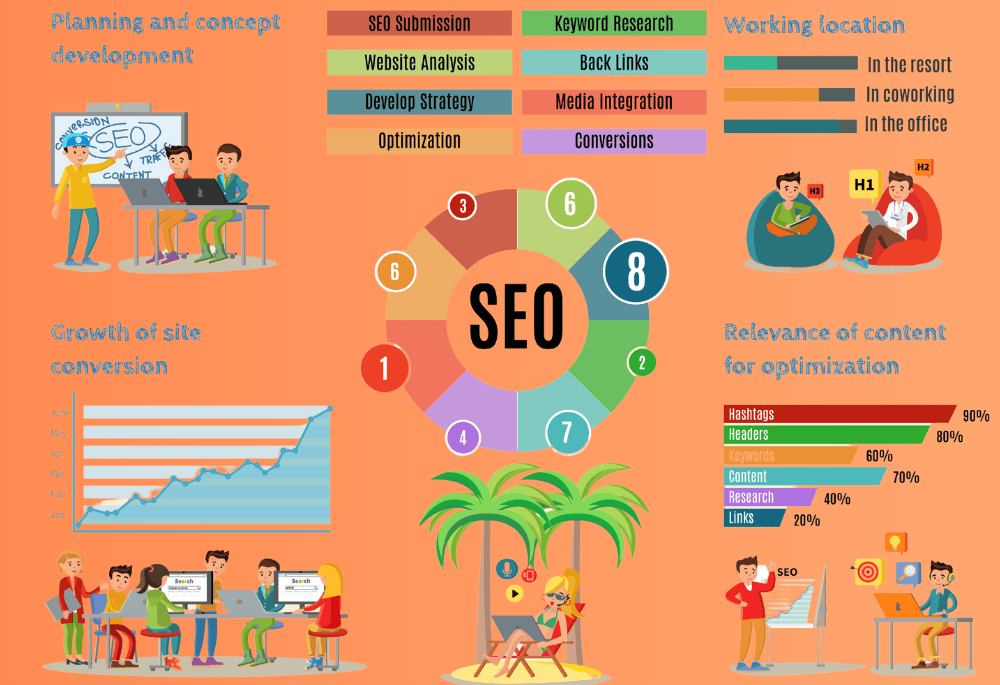Top 9 SEO Ranking Factors to Watch in 2025

I'm Vipin Chandrapal

Our Posts

What is Digital Marketing?
October 8, 2024

What is Digital Marketing?
October 8, 2024

What is Digital Marketing?
October 8, 2024

What is Digital Marketing?
October 8, 2024

What is Digital Marketing?
October 8, 2024

What is Digital Marketing?
October 8, 2024

What is Digital Marketing?
October 8, 2024

What is Digital Marketing?
October 8, 2024
What would happen if you pay no attention to the latest SEO ranking factors? Well, you might think the worse that can happen is the dipping of your website’s ranking. That’s just the tip of the iceberg, friends. The worst case can be the penalization or the banning of your website, if the algorithms shift and you fail to keep pace with the changes.
So, roll up your sleeves to know the SEO ranking factors that are likely to rule 2025 and beyond. Although the factors are in hundreds, we will highlight the major minions, based on our experts’ experience of the past 2-3 years. These factors are likely to have a deep impact (positive or negative) on your online presence.
Remember, as you begin to adopt the factors in your SEO marketing and prepare your website for the future, you will, eventually, discover other factors that major search engines like Google use in their ranking algorithm. Moreover, keeping a keen SEO eye can also help you catch the algorithm shifts (that happen often) and adjust your SEO strategy accordingly to maintain the winning edge.
Table of Contents
The Major 9 SEO Ranking Factors
Optimized content
No matter where you go or how many times Google changes its algorithm factors, content will stay the king. Nothing beats high quality content. Now, what’s “high quality” in the eyes of Google?
- Original and updated content
- Relevant content that meets audience’s search needs
- Popular content recommended by other high authority sites through backlinks
- Having high numbers of likes and shares and audience engagement
- Adequate length of content, though this is a debatable issue. However, surveys have shown that longer content, spanning 2000 or more words, is more likely to rank higher. But this isn’t a hard and fast rule. Keep the content length as per your topic needs.
Mobile-friendly website
Since 2015, Google has been preferring mobile-friendly websites due to the rise in the use of mobile phones around the world. It’s almost useless nowadays to have a website that does not run well on a mobile device. So, make sure you use a mobile-responsive theme or platform while designing a website. Sites that are easy to navigate and have a mobile-responsive design are found to be more popular among the audience. The future of digital marketing lies in mobile-responsiveness.
The extra security of HTTPS
This happened in 2014. Google suggested general best practices for site moves from HTTP format to HTTPS format so enable HTTPS on your servers. Both are basic protocols for sending and receiving information through website, with HTTPS being a more secure one than HTTP. HTTPS utilizes Secure Sockets Layer (SSL) Certificate to transfer data in the most secure manner possible.
Although transferring your site to HTTPS is not a ticket to boosting its ranking; staying in the old HTTP format can harm its ranking. This is because Google may emit a “not secure” warning to audience who click at your website. This may naturally hurt your site’s popularity. So, if you want your audience to know that your site is secure, migrate it to HTTPS. It is but natural that people would hesitate clicking on a “not secure” site, especially in today’s age of rising cyber threats.
Webpage loading speed
It’s a fast-paced world. You can’t afford to present before your audience a slow loading website and its pages. But mind you, there is a difference between website loading speed and page loading speed. The latter refers to the time taken to display the entire content of the particular page. On the other hand, website loading speed refers to how long it takes for your website to open when a visitor clicks on it.
Now, it may happen that your website opens easily, but when the user wants to open a page, it takes long.
Do you know if your webpage takes longer than 3 seconds, chances are that 50% of your visitors will bounce? Bounce rate impacts website ranking. You got only seconds to impress your audience!
Internal and external links
Your backlinks and referring domains contribute significantly to your website ranking. It is crucial to link with high authority websites to establish your authenticity. Linking to just any website for the sake of increasing your links is a bad idea. Make sure you carry out appropriate and relevant linking to be in the good books of search engines.
Earlier, it was only about the number of links. Now, Google has shifted its algorithm and the emphasis is more on the quality of links rather than the quantity. So, if your website features thousands of backlinks, but hardly a few of them come from websites that are in the high PA DA sites, then you must sit up and take notice. Your website isn’t going anywhere higher with such links; instead, Google may block your site or mark as spam due to irrelevant links.
Relevance is one of the key SEO ranking factors, whether it is content or backlinks. If your website is about bakery and suddenly you are getting links from a fashion garments website, it won’t do much good to your site.
So, take care of your inbound and outbound links. Link your website intelligently to gain more web traffic and recommendations from search engines.
Technical aspects of SEO
It is important to look after the technical aspects of SEO. In this regard, you may hire SEO agency, in case you have less time or expertise in carrying out technical SEO effectively.
Examples of technical aspects of SEO include:
- Inserting your main keyword in your page title or heading, as Google tends to index the title first to know the relevance of your site’s content.
- Structuring the content by using H1, H2, H3 headings and other aspects. This makes it easier for Google to index your content and increases your content’s readability quotient.
- Inserting your main keywords in alt text of images to let Google know that you are using relevant images and to help visually challenged users access your content easily.
- Creating meta title and description by using your main keywords in it. Description should be short and crisp to attract readership.
- Using “structured data markup” to let Google detect different elements of your website in a better manner and to let your page receive featured snippets.
You also need to take care of other technical aspects like crawling, website architecture, and others to allow proper indexing of your website. Remember, your website will become visible only when it is indexed by Google. It would also be a smart idea to carry out a technical SEO audit to determine the performance of your website and improve any aspect, if needed.
Expertise, Authoritativeness, Trustworthiness – EAT
One of the hottest SEO ranking factors in 2025 will be EAT. Search engines strive to ensure that users receive authoritative and credible information.
A few points to remember in this case are:
- Content quality, including data-backed information and expertise in the topic.
- Credentials of the author and links to authoritative sources.
- User-generated content that features testimonials and reviews and that engages the community.
Social engagement of content
Although social engagement does not impact your website’s ranking directly, but yes, they do help in pushing your website higher, as per SEO experts. That said, social media platforms can be great tools to popularize your content. When people like and share your content profusely, it catches the attention of Google. This, indeed, would help in your website ranking.
Here are two reasons why your social media content status can be one of the SEO ranking factors:
- When your content becomes viral on social media, traffic towards your website increases. This signifies to Google that your website has relevant content that is engaging the users and providing them useful information.
- More content consumption increases the chances of receiving more backlinks.
So, ladies and gentlemen, gear up to make the most of social media. Your website can reach newer heights (literally!) in search engine result pages (SERP).
UX Factors
User Experience (UX) factors play a vital role in your website ranking. The AI-based algorithm of Google can now keep a tab on the UX factors in real time. The search engine then uses this insight to rank websites.
Here are the three UX factors that Google mainly monitors:
- Dwell time: It refers to time duration a visitor stays on your website after they click on it through SERP. The longer the stay, the better.
- Bounce rate: It refers to the percentage of users who visit your website through SERP and then exit your site immediately. The higher the percentage, the more you must worry because this means your website is unable to provide relevant information to the visitor and is at risk of getting demoted in SERP.
- Click-through rate: It refers to the percentage of users who click on a search engine page result to visit your website. The lower the percentage, the more you must worry because your website is at risk of getting demoted.
So, it’s time to flex your SEO muscles and be ready for 2025. Your goal shouldn’t be just to rank high, but to establish a meaningful presence online.

I'm Vipin Chandrapal
I am a professional SEO consultant. Increase your organic traffic and sales with result-driven SEO services. Whether you have an in-house SEO team or are looking for an organic SEO consultant, I can help you accelerate growth with results-oriented SEO and content marketing strategies.
Category



